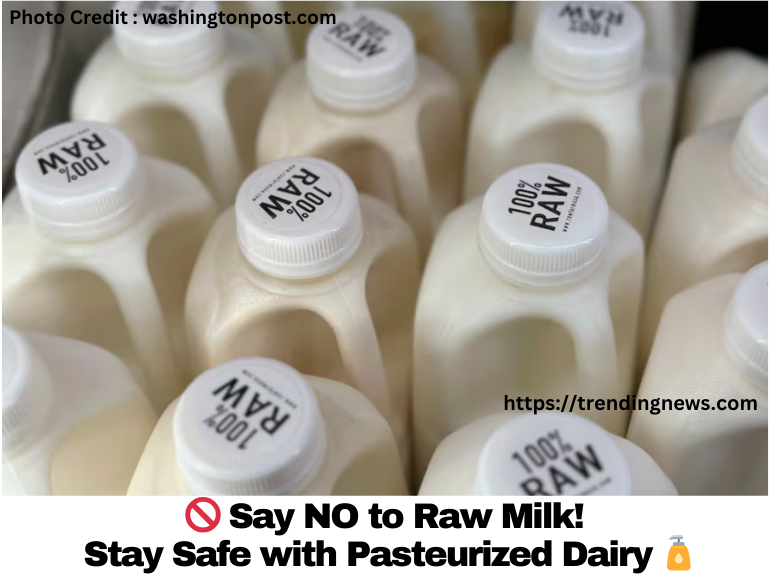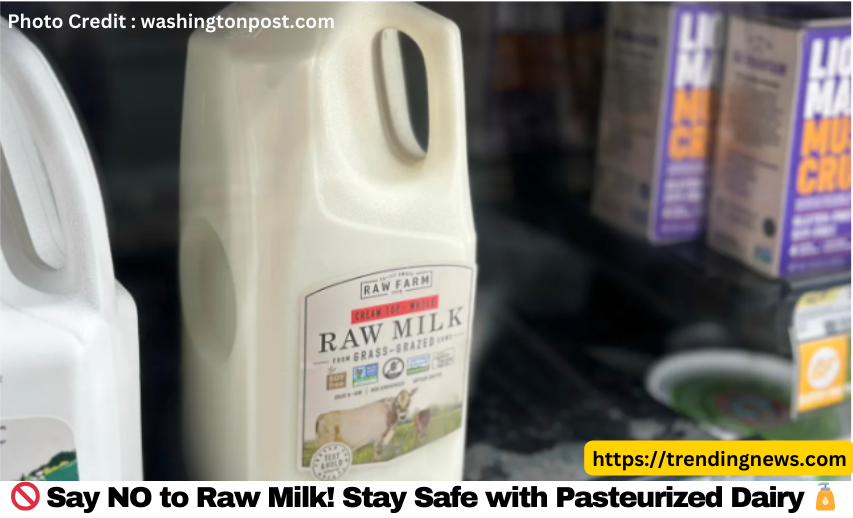In a concerning turn of events, bird flu in raw milk has raised serious alarm across California.
The California Department of Public Health (CDPH) recently confirmed that the H5N1 bird flu virus was detected in a batch of unpasteurized milk sold at retail stores in the state.
This discovery has prompted a voluntary recall of the affected products, drawing attention to the risks of consuming raw milk.
While no illnesses have been reported as of yet, this incident underscores the dangers of consuming unpasteurized dairy, a practice some social media influencers and public figures have advocated for despite well-established health risks.
This article will dive into the specifics of this alarming discovery, explore the health risks associated with raw milk consumption, and provide essential information to help you protect your health and that of your family.
What Happened in California?
In late November 2024, the California Department of Public Health confirmed that bird flu in raw milk was found in a batch of cream-top whole milk from Raw Farm, a Fresno-based dairy.
The milk, which has a “best by” date of November 27, 2024, was sold at various retail outlets throughout the state. This batch was tested by the Santa Clara Public Health Laboratory as part of a routine second line of consumer protection.
The lab identified the H5N1 bird flu virus in the sample, prompting immediate action from health officials.
Raw Farm issued a voluntary recall of the affected batch, and the California Department of Food and Agriculture (CDFA) increased its testing frequency at the dairy’s locations.
This includes conducting bi-weekly tests at Raw Farm’s facilities to ensure that any further contamination is swiftly identified.
Despite the positive detection of the virus, no illnesses have been reported in connection with the raw milk, but the incident highlights the ongoing risks posed by consuming unpasteurized dairy.

Why is Bird Flu in Raw Milk a Concern?
The discovery of bird flu in raw milk comes amid growing concerns over the transmission of the H5N1 virus.
While bird flu is typically spread among avian species, recent outbreaks have seen the virus jump from birds to mammals, including dairy cows.
In fact, scientists have detected the H5N1 virus in various mammals such as pigs, mice, cats, and even humans. As of now, there have been 55 confirmed human cases of H5N1 infection in the United States, but there is no evidence of person-to-person transmission.
The presence of the virus in raw milk is particularly concerning because raw milk has long been associated with serious health risks.
Pathogens such as Salmonella, Listeria, E. coli, and Campylobacter are common in unpasteurized dairy and can cause severe illness.
The bird flu in raw milk adds a new layer of danger, as the virus can potentially infect humans through the consumption of contaminated milk.
Health Risks of Consuming Raw Milk
Health officials have consistently warned against the consumption of raw milk, and for good reason.
Unpasteurized milk has been linked to numerous foodborne illnesses that can have severe consequences, especially for vulnerable populations such as young children, the elderly, and pregnant women.
The primary risks of consuming raw milk include:
Exposure to Harmful Bacteria
Raw milk has been shown to harbor dangerous bacteria like Salmonella, E. coli, and Campylobacter. These bacteria can cause symptoms such as:
- Stomach cramps
- Diarrhea (which may be bloody)
- Vomiting
- Fever
- Dehydration
In rare but serious cases, infections from these bacteria can lead to kidney failure, meningitis, or even death.
Risk of Avian Influenza (Bird Flu)
The recent discovery of bird flu in raw milk highlights the added risk of viral transmission. The H5N1 bird flu virus can cause severe respiratory symptoms, including:
- Fever
- Cough
- Sore throat
- Muscle aches
- Shortness of breath
Though rare, human cases of bird flu can lead to complications such as pneumonia, organ failure, and death.
While bird flu in raw milk is still a relatively rare occurrence, the virus’s increasing presence in mammals makes this a concerning development.
Risks to Vulnerable Populations
Certain groups are at a higher risk of serious complications from consuming raw milk:
- Children: Young children’s immune systems are still developing, making them more susceptible to infections from pathogens present in raw milk.
- Elderly: Seniors often have weakened immune systems, which makes them more vulnerable to infections from raw dairy.
- Pregnant Women: Raw milk can carry Listeria, a bacteria that can cause listeriosis, which can result in miscarriage, premature birth, or serious health problems for the baby.
- Immunocompromised Individuals: Those with weakened immune systems, such as individuals undergoing chemotherapy or taking immunosuppressive drugs, are especially susceptible to infections from raw milk.
Prominent Figures and the Raw Milk Debate
Despite the risks, raw milk has gained popularity in some circles, particularly among social media influencers and public figures who claim that unpasteurized milk offers a range of health benefits.
High-profile proponents such as Joe Rogan and Robert F. Kennedy Jr. have spoken out in favor of raw milk, with Kennedy even stating that he drinks raw milk regularly.
Supporters of raw milk often argue that pasteurization destroys beneficial nutrients and enzymes, and that drinking raw milk can improve digestion and boost the immune system.
The fact of these claims is that these claims are not supported by scientific research. In fact, pasteurization was specifically developed to eliminate harmful bacteria and pathogens from milk, making it safer for consumption.
The risks associated with bird flu in raw milk only serve to further underline the importance of consuming pasteurized dairy.
Health experts continue to recommend pasteurized milk as the safer choice for consumers, especially in light of the ongoing public health concerns related to avian influenza.
Preventing Illness: What You Can Do
Given the dangers posed by bird flu in raw milk, it is important for consumers to take precautions when purchasing and consuming dairy products. Some essential tips to protect yourself and your family:
- Choose Pasteurized Dairy :Always opt for pasteurized milk and dairy products. Pasteurization involves heating milk to a specific temperature to kill harmful bacteria and viruses, making it safe for consumption. Pasteurized milk provides the same nutritional benefits as raw milk without the associated health risks.
- Avoid Raw Milk Products :If you are currently consuming raw milk or unpasteurized dairy products, consider switching to pasteurized alternatives. The risks associated with raw milk are simply not worth the potential benefits that proponents claim.
- Be Aware of Recalls :Stay informed about product recalls related to raw milk. In the case of the bird flu in raw milk detected in California, the state health department issued a recall of the affected batch of milk. Make sure to check your dairy products for any recalls and dispose of any contaminated items.
- Educate Yourself and Your Family :Understand the risks of raw milk and educate your family members, especially children, about the dangers of consuming unpasteurized dairy. Make sure that everyone in your household is aware of the risks and chooses pasteurized milk as a safer option.
- Monitor for Symptoms :If you or someone in your family experiences symptoms such as stomach cramps, diarrhea, or respiratory distress after consuming raw milk, seek medical attention immediately. Early detection and treatment are key to preventing serious health complications.
Public Health Measures and Actions
In response to the detection of bird flu in raw milk, health authorities have taken several steps to protect public health:
- Voluntary Recall: Raw Farm issued a voluntary recall of the affected batch of milk, and retailers were instructed to remove the products from store shelves.
- Increased Testing: The CDFA is conducting bi-weekly tests at Raw Farm’s facilities to ensure that no further contamination occurs.
- Public Awareness: Health officials have issued public warnings about the risks of consuming raw milk, emphasizing the importance of choosing pasteurized dairy products.
Conclusion: Prioritize Your Health and Stay Informed
The recent detection of bird flu in raw milk in California serves as a stark reminder of the significant risks associated with consuming unpasteurized dairy.
While some proponents of raw milk claim it offers health benefits, the dangers far outweigh the purported advantages.
Raw milk has long been linked to various harmful bacteria, including Salmonella, E. coli, and Campylobacter, which can cause severe illness, particularly in vulnerable populations such as children, the elderly, and pregnant women.
And now, with the detection of H5N1, the bird flu virus, in raw milk, the risk of viral infections adds another layer of concern.
However, it’s not just bird flu that people need to be concerned about. One particularly dangerous pathogen that has been a frequent concern in raw dairy products is Listeria monocytogenes.
Listeria outbreaks have been linked to the consumption of raw milk and other unpasteurized dairy products, leading to serious health issues, including listeriosis.
Listeria Outbreaks: A Growing Concern
Listeria is a bacteria that can cause severe illness, particularly in pregnant women, newborns, the elderly, and those with weakened immune systems.
Listeriosis, the infection caused by Listeria, can lead to symptoms such as fever, muscle aches, diarrhea, and, in more severe cases, meningitis, septicemia, and even miscarriage in pregnant women.
The Centers for Disease Control and Prevention (CDC) estimates that about 1,600 people become seriously ill with listeriosis each year in the U.S., and approximately 260 of these cases result in death.
The reason Listeria is such a concern in raw milk is because it can thrive in cold temperatures, such as those in a refrigerator. This makes it harder to control in dairy products that have not undergone pasteurization.
Pasteurization is a heat treatment that kills harmful bacteria, including Listeria, by heating the milk to a specific temperature for a set amount of time, rendering it safe for consumption.
The risks associated with Listeria outbreaks highlight why the California Department of Public Health and other health organizations continue to warn against raw milk consumption.
While pasteurization eliminates Listeria and other harmful pathogens, raw milk remains a potential source of contamination, with the risk of listeriosis being just one of many serious health threats.
Stay Safe: Choose Pasteurized Dairy
In light of these concerns, it’s essential to prioritize your health and make informed decisions about the food you consume.
Choosing pasteurized milk and dairy products ensures you’re consuming products that have been treated to eliminate harmful bacteria, viruses, and pathogens.
By avoiding raw milk, you significantly reduce the risk of Listeria outbreaks and other foodborne illnesses like Salmonella and E. coli.
The bird flu in raw milk situation is just one of the many risks associated with unpasteurized dairy. When combined with the dangers of Listeria, the evidence becomes overwhelming: pasteurized dairy products are the safer choice.
Health authorities and food safety experts continue to recommend that consumers avoid raw milk and dairy products to prevent illnesses that can lead to hospitalization or even death
By staying informed, following public health guidance, and choosing pasteurized dairy products, you can protect yourself and your loved ones from the risks associated with raw milk.
The risks of raw milk simply aren’t worth it—whether it’s Listeria, E. coli, Salmonella, or now, bird flu in raw milk, the potential for serious illness remains high. Make safe choices today and prioritize your health for the future.
In conclusion, whether it’s bird flu in raw milk, Listeria, or other harmful pathogens, consuming unpasteurized dairy can have serious health consequences.
The dangers posed by these infectious agents are especially severe for vulnerable groups, including children, the elderly, and pregnant women.
While some individuals may argue in favor of the supposed health benefits of raw milk, the evidence overwhelmingly supports the safety of pasteurized dairy products.
Stay informed, choose pasteurized milk, and protect yourself and your family from these preventable risks.

